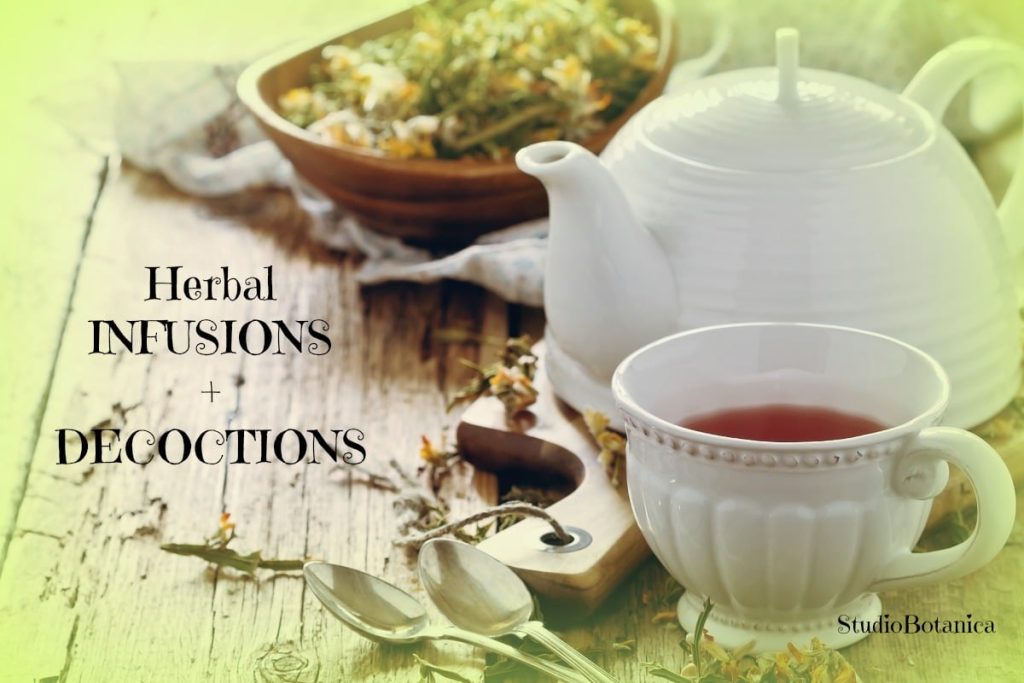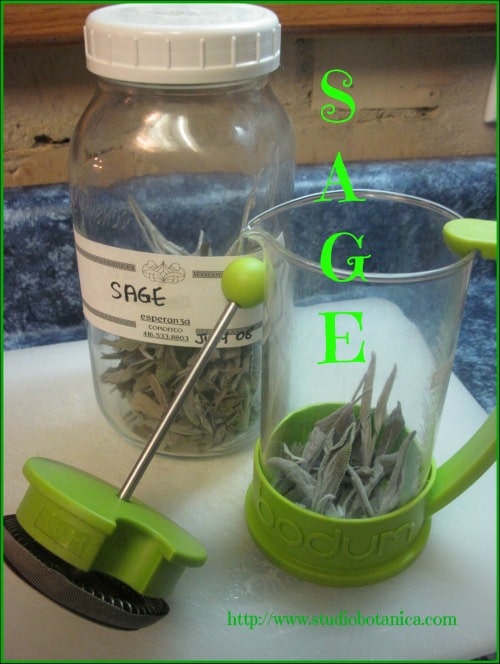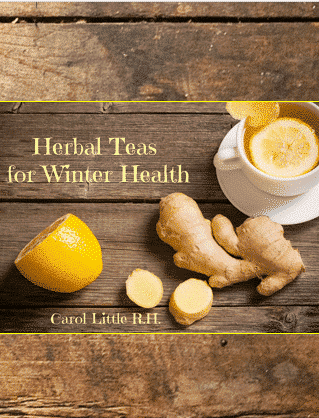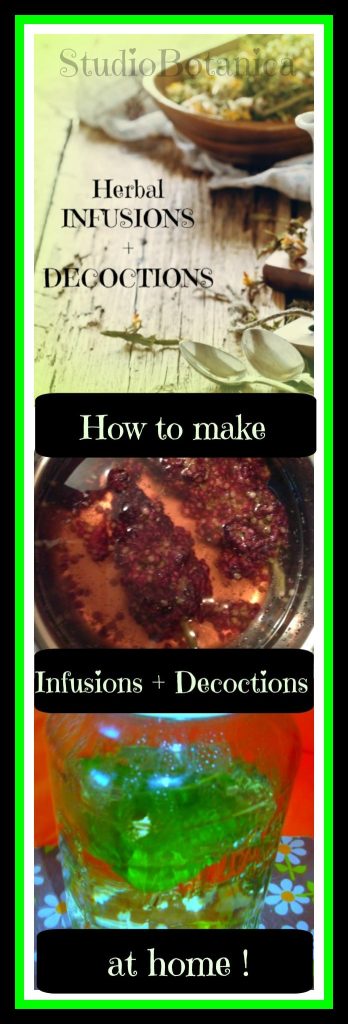I like to say that if you are not yet a lover of herbal tea, you just haven't found YOUR own tea blend yet.
What flavours do you like? When I blend a medicinal tea for a client, I always ask them about their personal 'taste' preferences. Do you like a minty taste or maybe you prefer citrus flavours? Do you like the 'autumn' flavours, or maybe exotic aromatics from the far East? It's helpful to know what your own personal 'num num' tastes are -- as we can then organize your blend to make herbal infusions + decoctions that will make you smile and ready to embrace!
Herbal medicine is all about extracting the healing benefits from our plant allies.*
We can use water, and create steams, infusions + decoctions, both hot and cold, in a conventional way or by the light of the moon. Water is the 'menstrum' and the 'vehicle' we use to extract the healing powers in TEA.
Sometimes a plant offers up gifts with water extraction (i.e. infusion + decoction) and sometimes the 'goodness' is better extracted using alcohol to create a tincture, or vinegar for that matter.
Sometimes we can extract the benefits by using glycerine, which results in a glycerite product. Sometimes we use a combination of a few methods. This is the science and art of herbalism.
This post is "DIY Herbal Infusions + Decoctions" and I hope it helps the many who have written, and encourages you to dive in and learn more about how easy it is to help you and your family feel better with a little or a lot of this magical herbal way to embrace the power of the herbal world!

An herbal infusion is made from leaves, flowers and fruits. The infusion can be prepared in a ceramic or glass teapot, French press, stainless steel pot or simple glass 'mason' or canning jar. I tend to use a glass jar or a Bodum (French) press. To prepare an herbal infusion, bring the desired amount of water to a boil, pour it over the herb, and allow it to sit covered, for 10-20 minutes. After straining the herb, the tea can be enjoyed warm or allowed to reach room temperature or as a cold tea, out of the refrigerator.
A decoction is a simmered tea and is the best preparation for bark, roots, medicinal mushrooms, and hard non-aromatic seeds. Use stainless steel or stove top-safe glass pot. The herb is placed in water and brought to a boil, then simmered with a lid on for 20-30 minutes.
Take off the heat, strain and enjoy. I encourage you to re-simmer these herbs again, for another time or two, as long as they continue to produce a strong tasting tea, they are still viable.
It's a good idea to store your strained roots or bark (etc) in the fridge between decoctions to reduce the chance of microbial growth.
If you are making a tea mixture containing a variety of herbs to be both infused and decocted, make your decoction, turn off the heat, and add your herbs to be infused. Strain after 10-20 minutes. Enjoy!
Note: Herbs with a high percentage of volatile oils are also typically prepared as an infusion, even if they are thicker plant parts like roots and bark
Experiment with herbs as "simples" (single herbs) to get to know each plant and each unique flavour and aroma. Herbal infusions + decoctions are a great low-cost way to experiment with our plant allies!
Folk method:
Generally, for most of the herbal recipes I share with you, this method is just fine:
Herbal proportions: 1 teaspoon of dried, cut and sifted herb, or herbal formula, or 2 tablespoons of fresh herb per 8 ounces of water.
When you see a recipe with "parts" -- this gives you the flexibility to make small or larger amounts of tea.
Why not start with 1 part dried herb = 1 teaspoon and make a simple infusion for 1 cup of tea. Taste it after infusing for 10 minutes. Make it again and let it steep longer. Which do you like?
Many herbalists use the following proportions: one handful of an herb or herbal blend to one quart of water. Typically a daily dose would comprise of three to four cups of tea. Use this relaxed and easy way to measure any "nutritive" herbs 'solo' or in a herbal blend.
Weight method:
.5-5 grams of dried herb, or your herbal blend, for every 1 cup of water
(Note this is an exact measure since it is using weight).
The therapeutic dose is often one cup (8 ounces) of tea three times a day. When using multiple herbs in a formula, decrease the amount of each individual herb. I normally suggest that we build the blend first and then measure it entirely and weigh to be able to be accurate.
Again, with nutritive herbs, the therapeutic dose is typically 3 x 8oz the dosage. Generally, you will want to research each herb and it’s particular dosage. If an individual is sensitive or convalescent or in a weakened state, smaller amounts are a good idea, initially.

(*obviously MUCH more to herbal medicine than simply extracting good attributes for healing, but that's a start! oxo Carol)
If you have the time, make your tea fresh daily. I normally make a quart of tea in the morning and sip it throughout the day. I use a glass canning jar, or if I am organized, a thermos. Herbal tea keeps fresh at room temperature for about twelve hours, and then it will taste "off". Sometimes, when living a very busy week, I will make 2-3 days worth of tea at a time, and while the tea is not as fresh, having prepared it -- I drink it and may not otherwise. I teach my clients to try this too, as it's better to drink a day-old tea than none at all. (Portion into a glass jar or thermos and refrigerate the rest, heating up as needed or enjoy cool) Please do not make herbal tea with plans to drink past 3 days in the fridge. At this point, I'd possibly throw it into the bath and have 'tub tea'!
Want to learn more about how YOU can increase your self-reliance and save $$ and feel better!?
It's not always winter -- but this eBook "Herbal Teas for Winter Health" has lots of great info and complete instructions for how to brew fabulous teas -- for immune health all year 'round!
You can find it here.

Here's to YOUR health ~ may your adventures in the herbal world be filled with fun and lots of herbal tea !
Carol xo
p.s.
If fresh or dried herbs are too daunting and you still are 'game' to try some herbs in tea bags
~~prefer to start off this way ? NO judging from me. I am all about wanting you to feel your best. Sometimes we are just too busy to think about a new habit/hobby/undertaking. As simple as I may say this is -- maybe a tea bag filled with good tea is a better choice for you. Here are some resources for you.



Liz @ The Lemon Bowl
You explained that so beautifully! Learned a lot!!
Carol Little
Thank you! I am so glad you found it helpful.
Katie Mae @ Nourishing Simplicity
I definitely use both methods, though infusions are something I use the most between the two.
Carol Little
Thanks Katie Mae ~ It just depends, really, one herb will release it's good gifts in an infusion and another will not.. so decoction becomes necessary. You are probably using more green herbs than roots and barks in your home concoctions!
Leslie-Anne
Wow, this is such an interesting post. I learned about 8 new things! I had never heard of a decoction before, thanks for such valuable info!
Yvonne Janowski
So informative and interesting. I love learning about herbal remedies.
Carrie
I love the sound of using sage for tea, it's my fav herb but never tried it in this way before. Thanks for all the helpful information too!
Cathy
I agree that there must be a herbal tea for everyone. Thank you for this most helpful tutorial.
Megan Stevens
Ooh, I like that handful of herbs approach + the quart of water! :)
Meredith
I love the idea of making herbal tea with some of the dried herbs I have! I often will go pick some fresh mint from my garden and sip that. Now I am going to branch out a little! Thank you!
Joni Gomes
So much good info here, thanks!
Emily @ Recipes to Nourish
I love herbal infusions! They're the best and always feel like a warm, cozy hug. I need to get back into a routine of making more. Thanks for the inspiration!
Jean
Never knew it was this to make infusions and decoctions! Thanks for this great info and instructions.
linda spiker
Educational yet again! I never knew the difference either:)
Tessa Simpson
I have been wanting to use more herbs and been tinkering...now I want to do more!
Lindsey Dietz
I never knew the difference between an infusion and a decoction until today! Learned something new today!
Raia
I'm always forgetting the difference between infusions and decoctions. Thanks for explaining it!
Shelby @Fitasamamabear
Herbal infusions have soo many benefits! I never use them enough.
Daniela
You read my mind - sometimes dry herbs can still be a little intimidating but you make it approachable and comprehensive and definitely less scary :)
Carol Little
Daniela, Thank you. That was my purpose for this post!